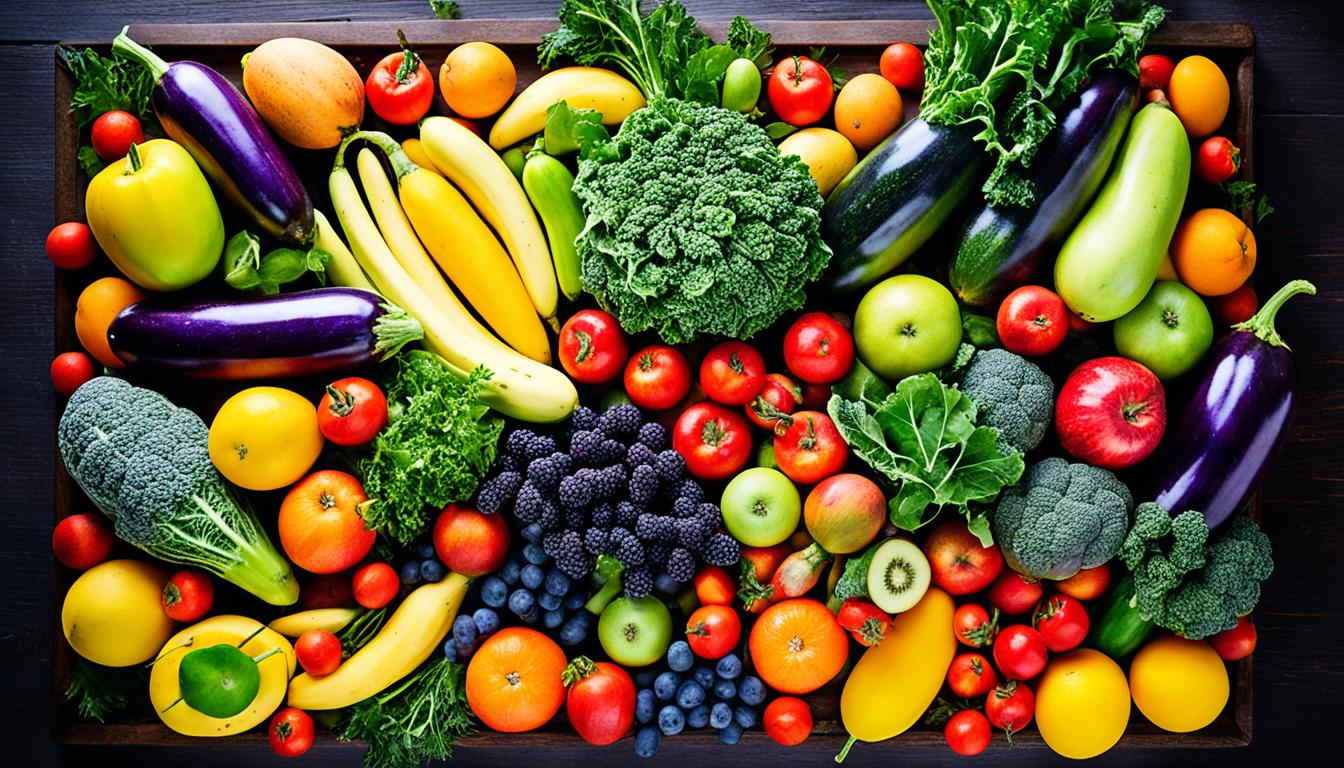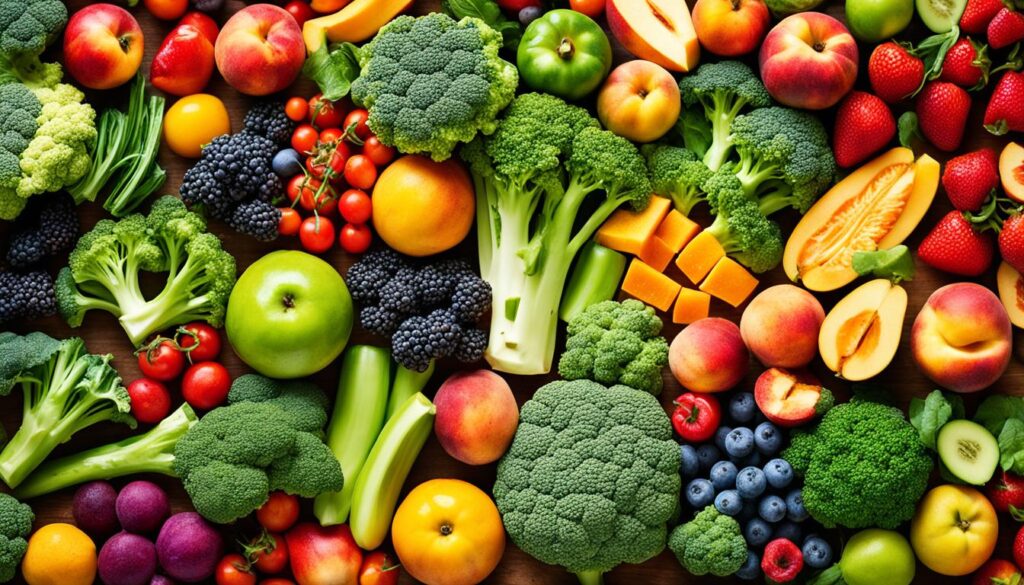Physical Address
304 North Cardinal St.
Dorchester Center, MA 02124
Physical Address
304 North Cardinal St.
Dorchester Center, MA 02124

Discover the incredible benefits of a plant-based diet, including weight management, improved heart health, reduced inflammation, increased fiber intake, and lower cancer risk.
Health and wellness are always changing. Now, the plant-based diet is at the forefront of keeping us well. This article will show you the awesome perks of going plant-based. It helps with keeping a healthy weight, having a strong heart, dealing with inflammation, getting enough fiber, lowering cancer and diabetes risks. We’ll also talk about how choosing this diet is good for the planet and animals.
A plant-based diet mainly consists of foods from plants. This includes fruits, veggies, grains, legumes, nuts, and seeds. It’s not the same as a vegetarian diet because you can eat some animal products, like poultry, eggs, and dairy. However, the main focus is getting nutrients from plant-based sources. It’s also different from a vegan diet where you can’t eat any animal products. In a plant-based diet, you can have some animal foods but most of your meal, at least two-thirds, should be from plants.
A plant-based diet is all about eating foods that come from plants. This means lots of fruits, veggies, grains, legumes, nuts, and seeds. The goal is to get most of your nutrients from these plant-based sources. It’s a healthy choice that cuts back on animal-based products.
This diet is like vegetarian and vegan diets but with some key differences. Vegetarians avoid meat but might eat eggs and dairy. A plant-based diet includes a little bit of animal-based food sometimes. Still, the idea is to eat mostly plant-based sources. On the other hand, vegans don’t eat any animal products. The focus of a plant-based diet is to have most of your meal, at least two-thirds, from plants.
A well-planned plant-based diet gives us all the nutrients we need. These diets are full of fiber, antioxidants, and helpful plant stuff. They also have potassium, magnesium, and vitamins A, C, and E. But, we should watch out for low levels of some nutrients like vitamin B12 and zinc. Adding fortified foods and taking supplements can help a plant-based diet be complete.
Being centered on nutrient-dense and fiber-rich foods sets apart a plant-based diet. This means lots of fruits, veggies, grains, legumes, nuts, and seeds. They’re packed with vitamins, minerals, and plant goodies. The high fiber helps you feel full, keeps blood sugar steady, and feeds healthy gut bugs.
Even though a plant-based diet meets most of our nutrition needs, watch out for some deficiencies. Not getting enough vitamin B12, niacin, and other nutrients is a concern. For those who avoid all animal products, adding fortified foods and supplements may be necessary. This ensures they get all the nutrients they need.

| Nutrient | Importance | Plant-Based Sources |
|---|---|---|
| Vitamin B12 | Crucial for red blood cell formation, neurological function, and DNA synthesis. | Fortified plant-based milk, cereals, and nutritional yeast. |
| Calcium | Necessary for bone health, muscle function, and nerve transmission. | Leafy greens, tofu, tempeh, fortified plant-based milk, and beans. |
| Omega-3 Fatty Acids | Important for heart health, cognitive function, and inflammation reduction. | Walnuts, flaxseeds, chia seeds, and algae supplements. |
| Iodine | Required for proper thyroid function and metabolism. | Seaweed, iodized salt, and fortified plant-based milk. |
Research shows amazing health benefits from a plant-based diet. Those who eat this way often have lower body mass indexes. They’re also better at losing and keeping off weight. The fiber and nutrients in these foods make you feel full, so you eat less.
Eating plant-based can improve heart health. It lowers blood cholesterol, cuts risk for high blood pressure and stroke, and could reverse heart disease. Plus, it fights chronic inflammation, a key cause of many diseases.
Plant-based foods are great at reducing chronic inflammation. This is important because it causes a lot of diseases. Eating less meat lowers risks of heart issues, stroke, and several cancers. It also fights against obesity, high blood pressure, and diabetes.
Plant-based foods cut chronic inflammation, which causes many diseases. It’s best to avoid processed meats. Things like deli meat, bacon, and sausage have too much salt and other bad stuff. So, it’s best to eat them sparingly.
A plant-based diet provides a lot more fiber than other diets. This is because it includes many fruits, vegetables, whole grains, and legumes. This increased fiber intake can do wonders for your body. It helps your digestive system work better, keeps your gut healthy, and even helps control your weight.
The Dietary Guidelines for Americans suggest adults eat 22–34 grams of fiber each day. But, most adults in the U.S. don’t get enough fiber. On average, Americans only eat about 15 grams daily. Yet, people on a vegan diet eat around 46 grams of fiber a day.
Fiber comes in two types, soluble and insoluble. Foods like beans and fruit have soluble fiber. This type is great for your gut and makes your stools softer. Insoluble fiber is found in foods like whole grains. It adds bulk to your stool and helps you stay regular. If you start a plant-based diet, cooking your food instead of eating it raw can make digestion easier.
| Fiber Intake Recommendations | Grams per Day |
|---|---|
| Age 2–8 | 14 grams |
| Age 9–13 | 22–25 grams |
| Age 14+ Females | 22–28 grams |
| Age 14+ Males | 28–34 grams |
While getting more fiber is great, too much fiber can cause problems. It might lead to constipation, diarrhea, or bloating. Extremely high amounts could even cause a blockage. But, this is very rare from a balanced plant-based diet.
If you feel bloated, too gassy, or sick when eating plant foods, you might have an issue. It could be a food allergy or a gut problem. Adding fiber slowly to your diet and choosing whole grains can prevent these issues.

Eating a plant-based diet might lower the risk of getting certain cancers, like breast, colon, and prostate cancer. This diet focuses on fruits, vegetables, and whole grains. These foods are rich in antioxidants and other good compounds, known to protect against cancer.
Food from plant-based sources is full of nutrients that fight cancer. It includes things like fiber, vitamins, minerals, and phytochemicals. They support the immune system, stop tumor growth, and cut down inflammation, which are key in beating cancer.
Not eating processed and smoked meats is crucial for cutting cancer risk too. These meats can form cancer-causing compounds when processed or cooked. By staying away from them, you protect yourself from these risks.
Plant-based diets are showing great promise against type 2 Diabetes. They offer lots of fiber and a low glycemic load. This helps keep blood sugar levels stable and boosts insulin sensitivity. Both are key parts of managing Diabetes.
Many studies point to the benefits of plant-based diets for managing blood sugar. Eating these foods means carbs get absorbed slowly. This leads to better blood sugar control. It can help people with Diabetes cut down on their medicine. They can manage their condition better just by changing their diet.
Eating plant-based can also make the body more sensitive to insulin. One study focused on overweight adults. It showed that switching to plant-based food led to better insulin use. This could be a huge help in managing Diabetes. Plant-based diets also fight inflammation. This may lower the chances of Diabetes-related issues.

| Statistic | Source |
|---|---|
| Global and regional diabetes prevalence estimates for 2019 and projected numbers for 2030 and 2045 | International Diabetes Federation Diabetes Atlas, 9th edition |
| Vegetarian diets were associated with a lower incidence of diabetes in the Adventist Health Study-2 | Study |
| Vegetarian diets improved insulin resistance and oxidative stress markers more than conventional diets in individuals with type 2 diabetes | Systematic review and meta-analysis |
| Participants following a low-fat vegan diet experienced improved glycemic control compared to a conventional diabetic diet | 12-week randomized clinical trial |
| A plant-based dietary intervention demonstrated improvements in beta-cell function and insulin resistance in overweight adults | Randomized clinical trial |
Choosing a plant-based diet helps the planet in many ways. This kind of diet is kinder to the Earth than eating a lot of animal products. Making plant-based foods like fruits and vegetables uses less land and water. It also creates fewer emissions than making animal-based foods.
Moving to a plant-based diet could cut deaths and greenhouse gases from food by 2050. Studies show it could lower deaths by 10% and gases by 70%. Placing a tax on cows’ emissions in New Zealand might slash methane by almost half by 2050.
Demanding a 33% tax on beef in Denmark is also suggested. This tax would help reach climate goals. It would swap two-thirds of meat with veggies and other plants.
Livestock farming leads to worldwide deforestation for animal feed and grazing fields. It uses a lot of water, which causes water scarcity. Plus, it makes a lot of waste, harming water and air quality. Going for a plant-based lifestyle reduces your environmental impact and aids in making food systems more sustainable.
Based on a Gallup Poll, 7 in 10 people lower their meat intake due to environmental concerns. Beef is a top source of greenhouse gas emissions. 57% of these emissions come from meat and dairy. Plus, the methane emissions from a few meat and dairy giants are more than 80% of the EU’s methane footprint.
Choosing beans over beef could vastly cut down on greenhouse gas emissions. This could meet almost three-quarters of the needed reductions. Eating 75 grams of beef daily for a year is like driving 7,196 miles. Instead, 150 grams of beans daily for the same time equals a car ride of only 93 miles.
A plant-based diet is good for health and the planet. It also makes us think about ethical considerations. People choose this diet because they care about animal welfare. They want animals treated better in the food industry. By eating less animal products, we reduce animal suffering. We also make more kind and ethical food choices.
The treatment of animals is a big reason for choosing a plant-based diet. As folks learn more about how animals are treated in farms, they want to eat less meat. This diet means we say no to using and hurting animals. Instead, we support kinder food systems.
Plant-based diets help talk about food justice. They make healthy and affordable food more available, especially for those who struggle. African American communities have faced problems because of unfair farming and food access. By making plant foods easier to find and cheaper, we can bridge these gaps. Everyone should have the chance to eat healthily, without damaging the planet or mistreating animals.
Plant-based diets are great for the environment, make us healthier, and care for animals. But, the movement needs to do better at being welcoming to all. The idea of a vegan as a wealthy, slim, white woman makes many feel left out. It’s time to change that image. Making food justice a priority will help make everyone feel they can join the plant-based lifestyle.

Moving to a plant-based diet might seem tough at first. But, you can make the change step by step. Focus on long-term changes more than quick fixes. First, add more plant foods to what you eat. This includes fruits, veggies, grains, legumes, nuts, and seeds. Also, cut down on animal products. Try new plant-based recipes and meal planning strategies. It helps to get tips from experts, plant eaters, and recipe sites.
Switching to a plant-based lifestyle doesn’t have to be sudden. You can start with small changes. For example, swap meat dishes for plant-based ones. Think bean chili, lentil curries, or stir-fries full of veggies. There’s a whole range of plant-based foods to enjoy. As you get used to it, add more plant-based foods to your meals.
Meal planning is vital for sticking to a plant-based diet. Look for yummy and healthy plant recipes. Play around with new ingredients and cooking styles. This keeps your meals tasty and satisfying. Use tools like plant cookbooks, blogs, and online communities for more ideas and plant-based meals excitement.
Adopting a plant-based diet has many benefits. These include managing weight and improving heart health. Also, there’s less inflammation and a lower chance of getting cancer. Scientific studies show eating plant foods can have a huge positive effect on our health. This way of eating is good for our bodies. Plus, it’s better for the environment and animals.
Switching to a plant-based diet might seem hard at first, but even small changes are helpful. This choice leads to amazing health benefits and helps the planet too. Research proves that choosing plants over meat can lower disease risks. It also makes a big difference for the environment. By changing what we eat, we can feel better and do our part for the planet.
Choosing a plant-based diet affects more than just ourselves. It connects us with nature and promotes caring for the earth and animals. When more people choose this way of eating, it leads to big changes. We become healthier, live in a cleaner world, and treat animals better. In the end, it’s about making choices that are good for everyone.